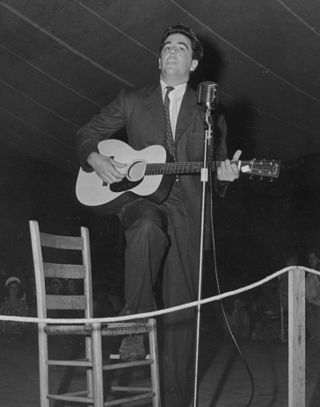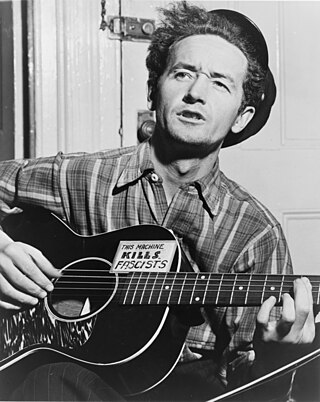Related Research Articles

Huddie William Ledbetter, better known by the stage name Lead Belly, was an American folk and blues singer notable for his strong vocals, virtuosity on the twelve-string guitar, and the folk standards he introduced, including his renditions of "In the Pines", "Pick a Bale of Cotton", "Goodnight, Irene", "Midnight Special", "Cotton Fields", and "Boll Weevil".

Woodrow Wilson Guthrie was an American singer-songwriter and composer who was one of the most significant figures in American folk music. His work focused on themes of American socialism and anti-fascism. He inspired several generations both politically and musically with songs such as "This Land Is Your Land".

Peter Seeger was an American folk singer and social activist. He was a fixture on nationwide radio in the 1940s, and had a string of hit records during the early 1950s as a member of The Weavers, notably their recording of Lead Belly's "Goodnight, Irene," which topped the charts for 14 weeks in 1950. Members of the Weavers were blacklisted during the McCarthy Era. In the 1960s, Seeger re-emerged on the public scene as a prominent singer of protest music in support of international disarmament, civil rights, counterculture, workers' rights, and environmental causes.

Alan Lomax was an American ethnomusicologist, best known for his numerous field recordings of folk music of the 20th century. He was a musician, folklorist, archivist, writer, scholar, political activist, oral historian, and film-maker. Lomax produced recordings, concerts, and radio shows in the US and in England, which played an important role in preserving folk music traditions in both countries, and helped start both the American and British folk revivals of the 1940s, 1950s, and early 1960s. He collected material first with his father, folklorist and collector John Lomax, and later alone and with others, Lomax recorded thousands of songs and interviews for the Archive of American Folk Song, of which he was the director, at the Library of Congress on aluminum and acetate discs.
The Almanac Singers was an American New York City-based folk music group, active between 1940 and 1943, founded by Millard Lampell, Lee Hays, Pete Seeger, and were joined by Woody Guthrie. The group specialized in topical songs, mostly songs advocating an anti-war, anti-racism and pro-union philosophy. They were part of the Popular Front, an alliance of liberals and leftists, including the Communist Party USA, who had vowed to put aside their differences in order to fight fascism and promote racial and religious inclusiveness and workers' rights. The Almanac Singers felt strongly that songs could help achieve these goals.
Industrial folk music, industrial folk song, industrial work song or working song is a subgenre of folk or traditional music that developed from the 18th century, particularly in Britain and North America, with songs dealing with the lives and experiences of industrial workers. The origins of industrial folk song are in the British Industrial Revolution of the eighteenth century as workers tended to take the forms of music with which they were familiar, including ballads and agricultural work songs, and adapt them to their new experiences and circumstances. They also developed in France and the US as these countries began to industrialise.
"The Bourgeois Blues" is a blues song by American folk and blues musician Lead Belly. It was written in June 1937 in response to the discrimination and segregation that he faced during a visit to Washington, D.C. to record for Alan Lomax. It rails against racism, the Jim Crow laws, and the conditions of contemporary African Americans in the southern United States. The song was recorded in December 1938 for the Library of Congress and re-recorded in 1939 for commercial release.
Harold Leventhal was an American music manager. Leventhal's career began as a song plugger for Irving Berlin and then Benny Goodman. While working for Goodman, he connected with a new artist, Frank Sinatra, booking him as a singer for a Benny Goodman event. Leventhal later managed The Weavers, Woody Guthrie, Pete Seeger, Alan Arkin, Judy Collins, Theodore Bikel, Arlo Guthrie, Joan Baez, Mary Travers, Tom Paxton, Don McLean and many others, and promoted major concert events in the genre, thus playing a significant role in the popularization and influence of American folk music in the 1950s and 1960s. He died in 2005 at the age of 86.
"Rock Island Line" is an American folk song. Ostensibly about the Chicago, Rock Island and Pacific Railroad, it appeared as a folk song as early as 1929. The first recorded performance of "Rock Island Line" was by inmates of the Arkansas Cummins State Farm prison in 1934.

The American folk music revival began during the 1940s and peaked in popularity in the mid-1960s. Its roots went earlier, and performers like Josh White, Burl Ives, Woody Guthrie, Lead Belly, Big Bill Broonzy, Richard Dyer-Bennet, Oscar Brand, Jean Ritchie, John Jacob Niles, Susan Reed, Paul Robeson, Bessie Smith, Ma Rainey and Cisco Houston had enjoyed a limited general popularity in the 1930s and 1940s. The revival brought forward styles of American folk music that had in earlier times contributed to the development of country and western, blues, jazz, and rock and roll music.
"Take a Whiff on Me" is an American folk song, with references to the use of cocaine. It is also known as "Take a Whiff ", "Cocaine Habit", and "Cocaine Habit Blues".
People's Songs was an organization founded by Pete Seeger, Alan Lomax, Lee Hays, and others on December 31, 1945, in New York City, to "create, promote, and distribute songs of labor and the American people." The organization published a quarterly Bulletin from 1946 through 1950, featuring stories, songs and writings of People's singers members. People's Songs Bulletin served as a template for folk music magazines to come like Sing Out! and Broadside.

One Grain of Sand is an album by American folk singer Odetta, first released in 1963. It was re-released on CD in 1997.

Folkways: A Vision Shared – A Tribute to Woody Guthrie & Leadbelly is a 1988 album featuring songs by Woody Guthrie and Lead Belly interpreted by leading folk, rock, and country recording artists. It won a Grammy Award the same year.

The Union Boys was an American folk music group, formed impromptu in 1944, to record several songs on an album called Songs for Victory: Music for Political Action. Its "all-star leftist" members were Josh White, Sonny Terry, Brownie McGhee, Pete Seeger, Burl Ives, Tom Glazer.

Folkways Records was a record label founded by Moses Asch that documented folk, world, and children's music. It was acquired by the Smithsonian Institution in 1987 and is now part of Smithsonian Folkways.

Moses Asch was an American recording engineer and record executive. He founded Asch Records, which then changed its name to Folkways Records when the label transitioned from 78 RPM recordings to LP records. Asch ran the Folkways label from 1948 until his death in 1986. Folkways was very influential in bringing folk music into the American cultural mainstream. Some of America's greatest folk songs were originally recorded for Asch, including "This Land Is Your Land" by Woody Guthrie and "Goodnight Irene" by Lead Belly. Asch sold many commercial recordings to Verve Records; after his death, Asch's archive of ethnic recordings was acquired by the Smithsonian Institution, and released as Smithsonian Folkways Records.
"This Train", also known as "This Train Is Bound for Glory", is a traditional African-American gospel song first recorded in 1922. Although its origins are unknown, the song was relatively popular during the 1920s as a religious tune, and it became a gospel hit in the late 1930s for singer-guitarist Sister Rosetta Tharpe. After switching from acoustic to electric guitar, Tharpe released a more secular version of the song in the early 1950s.
Anthony D. Saletan, known professionally as Tony Saletan, is an American folk singer, children's instructional television pioneer, and music educator. Saletan is responsible for the modern rediscovery, in the mid-1950s, of two of the genre's best-known songs, "Michael Row the Boat Ashore" and "Kumbaya". In 1955, he was the first performer to appear on Boston's educational television station, WGBH. In 1969, Saletan was the first musical guest to appear on Sesame Street.

Margot Mayo was an American dance instructor, educator, and collector of folk music.
References
- 1 2 3 4 5 6 7 Stern, Thomas (16 April 2016). "Hally Wood Resources". The Mudcat Café. Retrieved 7 August 2016.
- 1 2 Hally Wood Sings Texas Folksongs, by Hally Wood. Album overview at WorldCat website. Retrieved on 7 August 2016
- 1 2 Oh Lovely Appearance of Death, by Hally Wood. Album overview at discogs.com website. Retrieved on 7 August 2016
- ↑ New York Times, review article, Monday, December 23, 1957
- 1 2 "Hally Wood 1960". Association for Cultural Equity (at culturalequity.org). Retrieved February 8, 2016.
- ↑ Van Zandt, Townes (1977). Lomax, Joseph F.; Lomax, John M. (eds.). For the Sake of the Song. Musical proof-reading and lyrics corrections: Hally Wood. San Antonio, Texas: Wings Press. ISBN 978-0-930-32404-9.
- 1 2 Songs to Live By, by Hally Wood, Frank Davis. Album overview at discogs.com website. Retrieved on 7 August 2016
- ↑ "Rio Piedras 5/60 (1960)". Association for Cultural Equity (at culturalequity.org). Retrieved 8 February 2016.